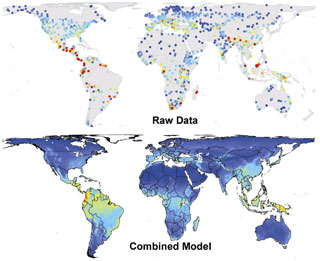A new map devised by biologists at the University of California, San Diego (UCSD) and the University of Bonn in Germany, shows that the Andes-Amazon region of South America, Madagascar, Borneo, and New Guinea reign as the world’s hotspots for plant diversity. The researchers say the map will help both prioritize areas for biodiversity conservation and forecast the impact of climate change on plant communities and the ecological services they provide .
The map, published in this week’s early online issue of the journal Proceedings of the National Academy of Sciences (PNAS), was produced by Walter Jetz of UCSD and Holger Kreft of the University of Bonn.
Jetz and Kreft sought “to determine how well the diversity, or the ‘richness,’ of plant species could be predicted from environmental conditions alone,” according to a release from UCSD.
 These maps depict the species-richness patterns of plants in 1,032 geographic regions worldwide. CLICK MAP TO ENLARGE. |
“Plants provide important services to humans—such as ornaments, structure, food and bio-molecules that can be used for the development of drugs or alternative fuels—that increase in value with their richness,” said Jetz, an assistant professor of biology at UCSD and lead author of the paper. “Tropical countries such as Ecuador or Colombia harbor by a factor 10 to 100 higher plant species richness than most parts of the United States or Europe.”
Seeking to developing a map that “accurately capture[d] the factors that promote high species richness of plants”, Jetz and Kreft combined high-resolution environmental data with field-surveys from more than one thousand sites worldwide.
“This allowed us to estimate the richness of yet unsurveyed parts of the world,” explained Jetz. “The global map of estimated plant species richness highlights areas of particular concern for conservation and provides much needed assistance in gauging the likely impact of climate change on the services plants provide to humans. It may also help to pinpoint areas that deserve further attention for the discovery of plants or drugs yet unknown to humanity.”
“Climate change may drive to extinction plants that hold important cures before we find them,” says Kreft, a biologist at the Nees Institute for Biodiversity of Plants at the University of Bonn. “Ecological research like ours that captures complex diversity – environment relationships on a global scale may assist in a small, but important way so that such a fatal potential failure can be averted.”
This article quotes extensively from a UCSD news release